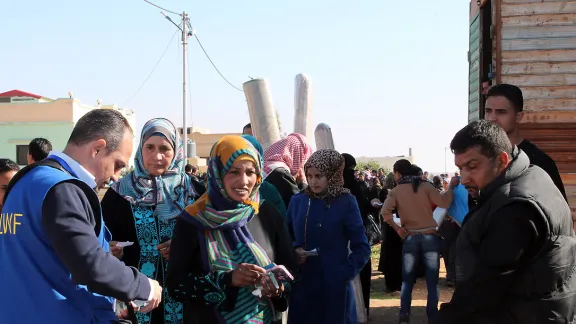
DWS director Maria Immonen urges staff to take care of themselves and one another. Photo: LWF Jordan
LWF urges staff to seek peace and care in difficult situations
World Humanitarian Day (WHD) celebrates the work of humanitarian workers the world over. From life-saving relief operations, food distribution, refugee support and psychosocial work, the dedication and commitment of humanitarians is critical.
The Lutheran World Federation (LWF) Department for World Service (DWS) runs a EUR 131 million program that reaches 2.7 million people across the world. Most of the 7,500 staff force worldwide carry out their work in challenging conditions. Many have been recruited from refugee communities themselves. A large number work in dangerous situations in conflict zones. What is common to them all is their dedication to improving the lives of people less fortunate.
A large staff contingent demands the organization prioritizes staff care.
DWS Director Maria Immonen says in crisis situations, staff can feel compelled to go above and beyond the call of duty, often putting their own needs and safety aside in the urgency of humanitarian response.
“Because of the increase in threats towards humanitarian workers over the last few years, we have invested in our security and safety management in all our country programs. In addition, we’ve been trying to promote the use and thinking of the terminology ‘team’. Our work is rarely about one person but most often about how the team comes together, especially in difficult circumstances, such as violent conflict, in which both the population and our staff can be traumatized.
The best support the teams have is each other. Teams need to be able to carry each other in difficult circumstances and be able to de-brief when things happen. We urge you do so,” Immonen says on this year’s WHD. Staff working with deeply traumatized populations can become traumatized themselves and bear disproportionate burdens themselves when faced with inhuman suffering and pain.
One option is to distance yourself, with the risk of becoming cynical and losing the motivation and drive for your work. We don’t want this. We do want to meet people eye to eye to share their burdens with them. Our colleagues cannot forget that they are only human and need to use their rest and recuperation (R & R) to take time off, go away, take care of themselves and enjoy life.”
Our work is rarely about one person but most often about how the team comes together, especially in difficult circumstances, such as violent conflict, in which both the population and our staff can be traumatized.
The recent spike in conflict in South Sudan required the LWF to place staff in hibernation in Juba. For six days, they could not move around freely because of the violent conflict in the immediate vicinity of the office. And then international staff were evacuated. It is always traumatic leaving colleagues behind in such dangerously unstable environments.”
Staff who work in psychosocial care and listen to the cries of grief and pain of survivors know how to deal with trauma professionally. “But occasionally, it affects you to a degree that you become partially traumatized yourself. In that situation, it is important to rely on your team members or professional help, and to find quiet time to reflect and offload.
"Look to each other, support one another, take care of yourselves.”
DWS Director, Maria Immonen


